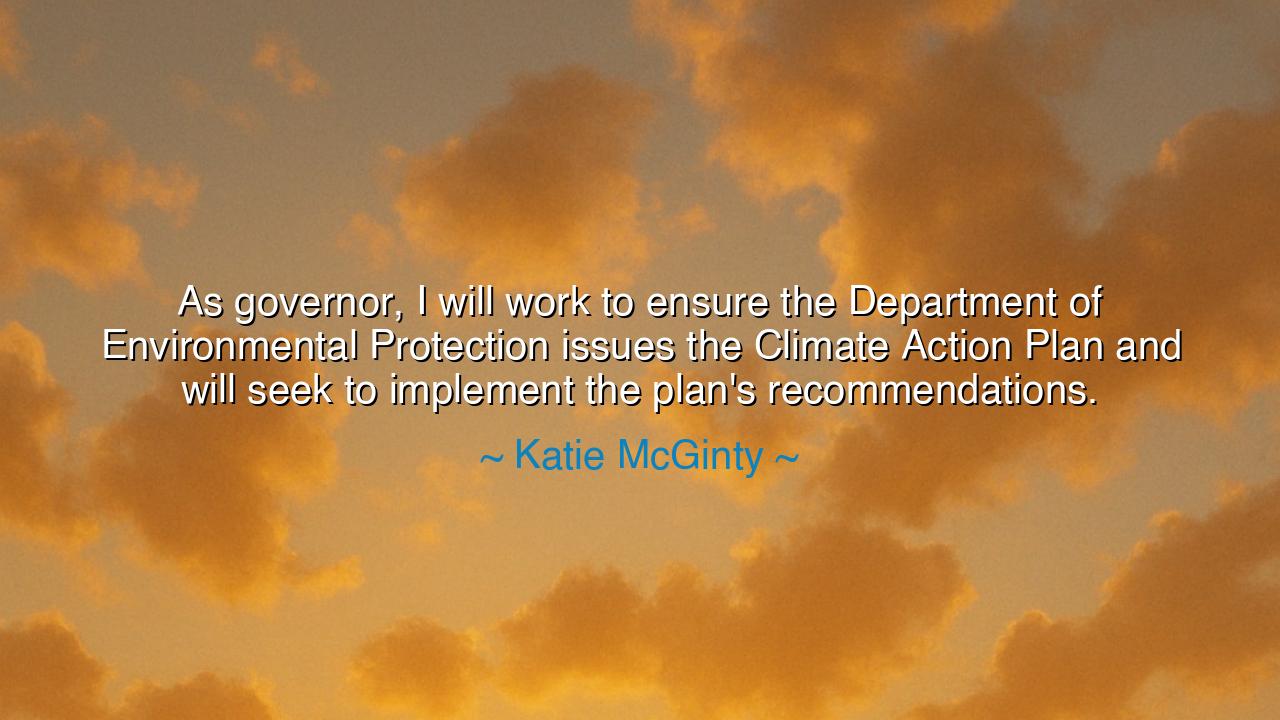
As governor, I will work to ensure the Department of
As governor, I will work to ensure the Department of Environmental Protection issues the Climate Action Plan and will seek to implement the plan's recommendations.






The voice of Katie McGinty rises with urgency and promise when she declares: “As governor, I will work to ensure the Department of Environmental Protection issues the Climate Action Plan and will seek to implement the plan’s recommendations.” This is not the dry language of policy alone, but a vow to safeguard the very breath of the earth. For in this age, when storms grow fiercer, seas rise higher, and forests fall silent, the call for a Climate Action Plan is no mere political pledge—it is a covenant between leaders and the generations yet to come.
At the heart of McGinty’s words lies the recognition that the environment is not a possession to be squandered, but a sacred trust to be defended. She speaks of the Department of Environmental Protection not as a distant office of bureaucracy, but as the guardian of rivers, skies, and soil. To issue and enact a plan is to say: we will not turn away from the signs of decay, we will not pretend the air is pure when it is poisoned, nor the waters clean when they run black. To make a plan is to confront reality with courage; to implement it is to act with integrity.
The ancients, too, knew this truth. Consider the collapse of the Mayan civilization, whose grand cities fell silent in part because of deforestation and drought. Their failure to balance human ambition with the limits of the earth left scars upon their people and their land. Contrast this with the wisdom of the Iroquois Confederacy, whose leaders taught that every decision must be weighed against its impact on the seventh generation. This principle of stewardship whispers across time to affirm McGinty’s promise: that true leadership looks beyond the present moment and safeguards the future.
Her words also remind us of the fragile bond between trust and action. Many leaders have spoken of the need for environmental care, but words without deeds are like seeds scattered on stone—they take no root, they yield no harvest. To seek implementation is to move beyond rhetoric, to translate vision into law, and law into lived protection. This is the measure of true governance: not what is promised in speeches, but what is planted, preserved, and protected in the soil of reality.
The message also carries a deeper lesson for each of us. For while governors and nations may draft great plans, the daily stewardship of the earth belongs to all who walk upon it. A plan is but a map; its success depends on the hands and hearts of those who follow it. If rivers are to be kept clean, it requires restraint in the factory and reverence in the household. If forests are to endure, it requires both laws against destruction and a culture that cherishes trees not as timber, but as life.
We must therefore take up the spirit of McGinty’s vow in our own lives. Begin with small acts that echo the larger plan: reduce waste, plant trees, guard water, honor the land. Support leaders who see not only the wealth of the present but the inheritance of the future. And above all, cultivate the vision of the seventh generation, asking not only what benefits us today, but what blessings—or curses—we leave for tomorrow.
So let the teaching be remembered: to issue a Climate Action Plan is to speak, but to implement it is to fulfill a sacred duty. Words alone cannot cool the planet, nor promises alone cleanse the air. Action is the fire that transforms intention into salvation. Walk, then, as guardians of the earth, and may the generations to come look back and say of us: they heard the cry of creation, and they answered with courage.






AAdministratorAdministrator
Welcome, honored guests. Please leave a comment, we will respond soon